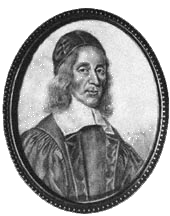Conceit
an ingenious and fanciful notion or conception, usually expressed through an elaborate analogy, and pointing to a striking parallel between two seemingly dissimilar things. A conceit may be a brief metaphor, but it also may form the framework of an entire poem. A famous example of a conceit occurs in John Donne’s poem “A Valediction: Forbidding Mourning,” in which he compares his soul and his wife’s to legs of a mathematical compass.
The Pulley
George Herbert
When God at first made man,
Having a glass of blessings standing by,
Let us (said He) pour on him all we can:
Let the world’s riches, which dispersed lie,
Contract into a span.
So strength first made a way;
Then beauty flowed, then wisdom, honour, pleasure:
When almost all was out, God made a stay,
Perceiving that alone of all His treasure
Rest in the bottom lay.
For if I should (said He)
Bestow this jewel also on my creature,
He would adore My gifts instead of Me,
And rest in Nature, not the God of Nature:
So both should losers be.
Yet let him keep the rest,
But keep them with repining restlessness:
Let him be rich and weary, that, at least,
If goodness lead him not, yet weariness
May toss him to My breast.
In the poem “The Pulley”, by George Herbert, the conceit that is repeated throughout the poem is “rest”. "Rest," the blessing God withholds, leaves us with "restlessness." As our restlessness drags us down (on one rope of the pulley), we rise (on the other rope) to God, who gives us the blessing of Rest. By using “rest” as the conceit, Herbert is able to compare the sins of human nature to “rest”.
An example of conceit may be comparing a relationship to green meat.

"He who cannot forgive breaks the bridge over which he himself must pass." ~George Herbert
George Herbert

George Herbert was born in Montgomery, Wales, on April 3, 1593, the fifth son of Richard and Magdalen Newport Herbert. After his father's death in 1596, he and his six brothers and three sisters were raised by their mother, patron to John Donne who dedicated his Holy Sonnets to her. Herbert was educated at Westminster School and Trinity College, Cambridge. His first two sonnets, sent to his mother in 1610, maintained that the love of God is a worthier subject for verse than the love of woman. His first verses to be published, in 1612, were two memorial poems in Latin on the death of Prince Henry, the heir apparent.
Herbert could have used his post of orator to reach high political office, but instead gave up his secular ambitions. Herbert took holy orders in the Church of England in 1630 and spent the rest of his life as rector in Bemerton near Salisbury. At Bemerton, George Herbert preached and wrote poetry; helped rebuild the church out of his own funds; he cared deeply for his parishoners. He came to be known as "Holy Mr. Herbert" around the countryside in the three years before his death of consumption on March 1, 1633.
A Priest to the Temple (1652), Herbert's Baconian manual of practical advice to country parsons, bears witness to the intelligent devotion with which he undertook his duties as priest. Herbert had long been in ill health. On his deathbed, he sent the manuscript of The Temple toNicholas Ferrar, asking him to publish the poems only if he thought they might do good to "any dejected poor soul." It was published in 1633 and met with enormous popular acclaim—it had 13 printings by 1680.
Herbert's poems are characterized by a precision of language, a metrical versatility, and an ingenious use of imagery or conceits that was favored by the metaphysical school of poets. They include almost every known form of song and poem, but they also reflect Herbert's concern with speech--conversational, persuasive, proverbial. Carefully arranged in related sequences, the poems explore and celebrate the ways of God's love as Herbert discovered them within the fluctuations of his own experience. Because Herbert is as much an ecclesiastical as a religious poet, one would not expect him to make much appeal to an age as secular as our own; but it has not proved so. All sorts of readers have responded to his quiet intensity; and the opinion has even been voiced that he has, for readers of the late twentieth century, displaced Donne as the supreme Metaphysical poet.
(http://www.luminarium.org/sevenlit/herbert/herbbio.htm)
